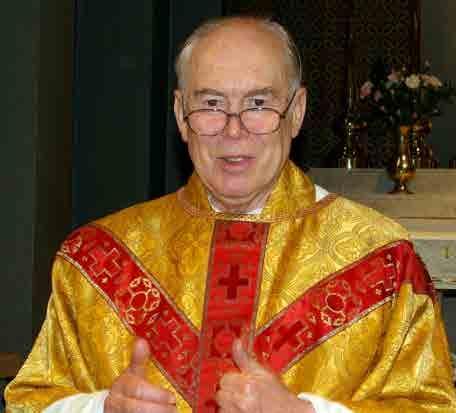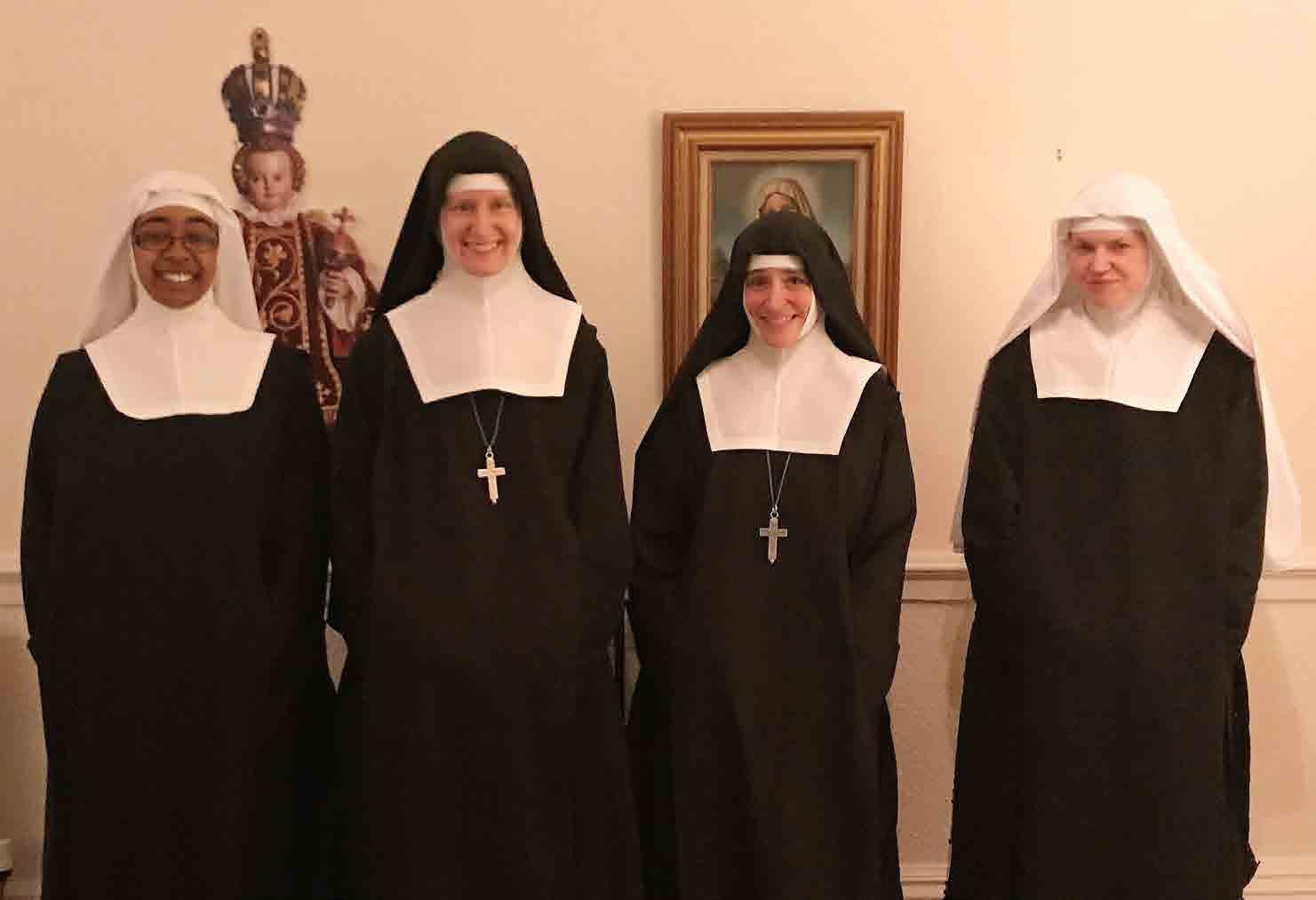
9 minute read
Father Michael remembered
A sermon on the late Fr Michael Clifton from Fr Christopher Basden, preached before Archbishop Peter Smith of Southwark
"I believe that the one great reason for which I was born was my ordination to the priesthood.” These famous words – by Fr Louis Merton OCSO - could very well have been uttered by Fr Michael George Clifton, commonly called “Cliffie” or “Ernie” by his students at Fisher’s School. He has been one of the great characters of our Diocese and to the fingertips he was quintessentially a priest.
The priesthood is (to use the American adjective) simply “awesome.” It is a unique vocation; to stand in the place of Jesus Christ; to sow the seeds of the Word of God; to sanctify the faithful with the life of the sacraments! We need priests and, on the occasion of losing one, it’s a good time to appeal to you to pray for and encourage vocations; or, if there is anyone who is not as bald as I am, or as grey as some of my brothers here, to actually consider the call because it is so wonderful and urgently necessary!
The readings today set forth an extraordinary panorama, Ezekiel 34: 11-16, the beauty of the good shepherd; then 2 Peter: 1-10 on the horrendous infiltrations into the church and society, for which we need good priests to courageously resist. Finally, the Gospel, St Matthew 11: 7-12, “the kingdom of Heaven has been subjected to violence.” The sacrament of the Kingdom is the Church and both have been taken by storm by the violent. Fr Clifton has been a voice crying in the wilderness against the storms of pseudo-phycology, destructive theology and the most awful erosion of Christian belief in the history of the Church.
Michael Clifton, like many of our best Catholics was a convert but few know that he had another profound conversion in his life in 1968, as he recounted on his blog “Father Mildew”. Before that time, he had been a member Fr Michael Clifton: a gift for friendship of Slant, a left-leaning Catholic journal published in Cambridge between 1964 and 1970 and thought the Church needed to be shaken up. He was (to use the incorrect political terminology) a “progressive” and a “liberal” demanding complete change. Also in that very year, one of the foremost “Periti” of Vatican II, Joseph Ratzinger, also changed his mind. He later prophetically declared, “At the heart of the ecclesial crisis is the state of the liturgy.” As Catholics, we have always believed in the principle of “Lex Orandi – Lex Credendi”, in other words the way you pray expresses the way you believe. The chaotic, fashionable, priest-centred, showy, utterly intelligible, and neo-protestant type of Liturgy no longer really squares with the belief of traditional Catholicism (especially its Eucharistic theology).
Fr Clifton came to realise that there had been a divergence and that that departure from the roots of our faith had resulted in a terrible haemorrhage of Mass attendance, ordinations and conversions that has left Europe a spiritual wasteland.
Fr Clifton could smell the sulphur even before the reforming Pope Paul VI did in 1972 when he said: “We believed that after the Council would come a day of sunshine in the history of the Church – but instead there has come a day of clouds and storms and of darkness – and how did this come about? … We will confide the thought that there has been a power, let us call him by his name – the Devil! It is as if from some mysterious crack – no, it is not mysterious – from some crack the smoke of Satan has entered the sanctuary of the Church.” Archbishop Fulton Sheen remarked that, as the Master always warned us, we would have enemies but today the enemy was from within.
Fr Clifton could very well have been tempted to jump ship as there was profound confusion, but for the Grace of God we have persevered as did he, but if only we had kept the priests we had ordained, we would not have a vocations problem today (contemporary defections from the priesthood have never been so colossal since the beginning of the Church). Alternatively, he did not follow Fr Wilders or Fr Lessiter in the direction of Archbishop Lefebvre, instead he remained loyal to the Diocese. In his books he chronicled the infiltrations as in the Alliance of Dissent and wrote many books on the history of Southwark as for example Amigo: Friend of the Poor and The Quiet Negotiator: Bishop Thomas Grant.
Let me tell you a story: before the establishment of the Confraternity of Catholic Clergy (which happily offers priests occasions of fraternity and nourishment), at St Bede’s we used to host a regular Priest’s seminar. On one occasion, we invited Fr Mark Vickers to speak on his upcoming biography of Cardinal Bourne. When I welcomed him at the front door, he whispered to me, “I hope you haven’t invited Fr Clifton!” I responded that indeed I had – the seminar was open to all. At the end of the talk, Fr Clifton immediately spoke and said, “I would like to say that I totally disagree with almost everything you have said” – and so the rivalry continued!
We live in a time when the Catholic priesthood has been besmirched and disgraced by the horror of abuse – this goes against everything the priesthood stands for. Do we still want to promote vocations? (Why ever why?!) Yes, because the Gospel, the priesthood and the Mass in their truest forms are the most beautiful things this side of Heaven!

Fr Michael Clifton: a gift for friendship
There are two great characteristics from which we can learn from our departed brother: 1) his gift of friendship. 2) his love of culture. 1 – the Christian, and especially the priestly apostolate, is best expressed in friendship. St Thomas More for example was described as being “born for friendship.” Of course we are all unique and Fr Roger Nesbitt, a good friend of Fr Clifton’s from Fisher School days remarked, “When God created Michael Clifton he left out tact!” Marygold Turner (of the Latin Mass Society in Kent) echoed this saying, “He was funny, interesting, demanding and in his Homilies shot from the hip with no punches pulled.” The Tydlesley family of Balham remember him fondly from the Traditional Mass community at Colliers Wood (where Fr Martin Edwards said his first Mass secretly behind locked doors in 1991). There was fun, work and lovely trips.
Secondly, culture is one of the Catholic ways of presenting the Gospel of Our Blessed Lord Jesus Christ. Fr Clifton was a man who loved culture. “Culture Vultures” was one of his lunchtime clubs at The Fisher School. He loved music, opera, polyphony and worked for years with Charles Finch who, with his sterling singers, “Cantores Missae”, are here with us today. One young man who was amongst those taken to concerts was amazed to find this stiff and strict character welling up with emotion at the music. Young John-Joe Tydlesley would get into fits of giggles at his rendition of Goethe’s Faust. He would sing badly (on purpose?) and enthusiastically the “ha, ha, ha’s” of the character being condemned to Hell.
Hell? What’s that? Something never mentioned anymore in sermons! Fr Hugh Thwaites once told me wistfully, “Of course most people go there” – I was shocked, “How can you ever say that?” I retorted, “Our Blessed Lord said so.” I responded, “Where?” He said, “Will there be only a few saved? Try your best to enter by the narrow door, because I tell you many will try to enter and not succeed.” Now let me assure you, I am appalled at the thought of the type of preaching which holds people hostage to fear – “Perfect love casts out fear!” – but love is not always perfect and today salvation is often lost sight of. The missionary imperative has largely vanished saved for development. Our hospitals and schools are wonderful but they are not enough.
So how on earth can we ever persevere in being faithful, supernatural, Catholic Christians in this society? This so-called ‘culture’ is grossly materialistic, allergic to religious devotion and transcendent only in erotomania and the drug culture. How did Fr Clifton remain on the road to the end? He was faithful to the interior life. I often saw him at the monthly day of recollection at Wickenden Manor. I would like to take this opportunity to thank the priests of the Opus Dei who have visited priests, encouraged priests to be loyal in good times and bad – long before there was ever an official “ministry to priests.” Fr Clifton was regular at getting topped up at their recollections. You simply cannot face the bleak empty face of disbelief without being faithful to sacramental / prayer life. Here was his secret!
In many ways, Fr Clifton was seen as a maverick, he was marginalised, often unappreciated, undecorated and even semi-exiled, but then so was the Master. At the end, in Heathfield (and we thank the Sisters of Grace and Compassion there) he was still apostolic, still forging friendships and promoting culture. I remember once asking the old Dominican Archbishop (who ordained me), while visiting him shortly before his death at the age of 96, if his priest brothers visited him. His reply was sobering. The Sisters come regularly but for the men, it’s “out of sight – out of mind”. Fr Clifton was uniquely blessed with a brother priest who visited him every day! This was Fr Peter Fitch, also resident at Heathfield, a young Brentwood priest who had had health issues. He said he learnt so much from Fr Clifton. Latterly Peter has been going on supplies around A&B and Fr Clifton would delight in working out to the minute the bus and train timetables! Sometimes he would want to accompany Peter who would have to remind him, “Father, remember this is my supply!” Recently Fr Peter was trying to teach Fr Michael how to use his new mobile phone. One day, at home with his parents, Peter’s phone rang, it was Fr Clifton. However, when he heard Peter’s voice, he exclaimed, “Oh not you”, and put the phone down. They had become great friends by the time Fr Clifton was dying on 23 February. Fr Peter held his hand and they said the Rosary together; Fr Clifton’s voice was getting softer, so Fr Peter proceeded on with the Litany of Loretto; the breathing became laboured and when he said, “Our Lady, Queen of the Clergy”, he felt the grip had gone – he had departed.
Eternal Rest grant unto him O Lord, and perpetual light shine upon him. May he rest in Peace.
Fr Christopher is Parish Priest at St Bede's, Clapham Park in the Archdiocese of Southwark










